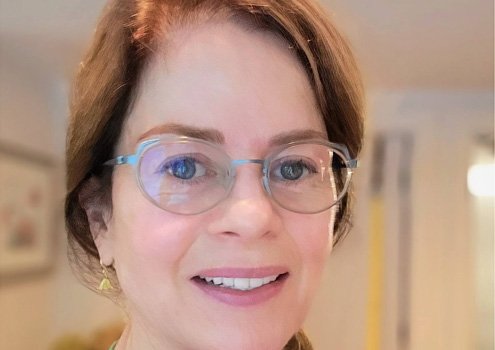Reading time: About 2 minutes
Rue Matthiessen says that taking an 18-month break from her most recent book helped her to see its flaws and understand how to fix them…
Rue Matthiessen is a writer based on the East End of Long Island. Nominated for the Pushcart Prize twice, her essays and short fiction have been published in many literary journals. Her book, Buttonwood Cottage, describes renovating a house in the Caribbean, scuba diving, and Bonaire’s natural world. Her memoir, Castles & Ruins, about growing up in Sagaponack, NY, with writers of immense literary ambition, was published in February 2024. Her art-theft novel, Woman with Eyes Closed, set in Sagaponack, London, and the Netherlands, was released by Latah Books in June 2025.
I was excited to talk to Rue about her approach to writing.
Q. Roughly how much time do you spend writing every day?
Two to three hours.
Q. What’s a simple activity or habit that makes you a better writer?
I use a focus app. I set it for 55 minutes, and I don’t leave the desk during the times I designate for myself.
Q. What interferes with your writing?
Activity in the house! But I’m good at shutting it down, using noise-blocker earbuds, and generally carving out time for myself.
Q. How do you persuade yourself to sit down to write on days when you really, really DON’T feel like doing it?
I’m past the point of having to talk myself into it. The fact is, if I don’t do it, books are not going to get written.
Q. Is there a particular motto or saying that you’ve found helpful for writing?
No, but I will say that waiting for a moment of inspiration is a waste of time. Inspiration is earned. Also, I’ve had days I thought were great and productive, and then looked at the work and was underwhelmed. I’ve also had days where I thought it went very badly, and then looked at the work and was amazed at how much better it was than my earlier estimation. Writing is an alchemy, a synergy, a culmination of many moving parts. It’s also quite amazing what goes on in one’s subconscious. With my book, Woman with Closed Eyes, I had an earlier draft that I believed was done, but the reception, by friends and readers, was lukewarm. I walked away from it for a year and a half, and did another project. When I returned to Woman with Closed Eyes, I saw the book wasn’t fully developed. I could see the story, but it wasn’t coming across. After taking a break, all the ways I could develop it had become blindingly clear. On the re-write, the characters came alive for the first time, the story became really tight. All the themes came through, and it was very satisfying. It happened when I wasn’t thinking about it at all.
Q. Which stage of the writing process do you enjoy the most: researching, writing or editing/rewriting and why?
Least of all, the research. Best of all, editing, when editing is going well. Sometimes a chapter looks like mush on a page. Sometimes a piece of writing cannot be edited into life and has to be thrown out. But then sometimes, editing brings the story to the fore, and it gains a sort of life that was there, but hidden. It’s just like polishing a stone until it gleams.
Q. What’s one of the best books you’ve read (either fiction or non) in the last five years?
Demon Copperhead, by Barbara Kingsolver. It’s a very important book, and I wish everyone would read it. Many years ago,, practically everyone in the country read Uncle Tom’s Cabin, by Harriet Beecher Stowe. That book tipped off the abolitionist movement and the Civil War. Books are the way we understand someone’s experience that is not our own.
Q. What book are you reading right now?
I am reading The Go-Between by L.P. Hartley. I am partial to old English books. Also, The Guest, by Emma Cline.
Q. What do you think is the biggest misperception that new writers have about the act of writing?
I couldn’t say because I grew up with writers and stacks of manuscripts and books everywhere. But maybe, if a new writer is not supported, and has people around them who say it isn’t practical or smart, they must shut out the noise and do it. Most real writers have to write, no matter what others think.


